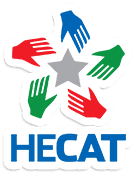How to become part of the HECAT family
HECAT Admission process
HECAT was born with the purpose of supporting low- income families that seek high-quality education for their children. Therefore, a strict admission process must be followed:
- Pick-up a pre-application form and submit it with originals and a copy of your national ID, proof of address and (stamped) proof of income for the last 2 months.
- Request a receipt to pay for a socioeconomic survey
- Sign a commitment letter to continue with the process.
- Once the socioeconomic study has been carried out, if approved, the corresponding psychometric and psychological tests will be applied to the student.
- (In case of applying for a school grade, other than 2nd grade of preschool, your application will be placed on a waiting list as long as the student passes the corresponding required academic and English tests).
HOW DOES HECAT CONTRIBUTE TO SOCIETY?
Educational program
- Bilingual education during extended hours
- Civics/ values workshop
- Body expression workshop
- Big brother/sister mentoring
- Music and art workshop
- Meditation
- School of Mariachi
- Electricity workshop (for middle school students)
Food program:
- 3 nutritious meals a day
- School Gardening: Vegetables
- Workshops and nutritional counseling
Health program
- Daily sports classes
- Bimonthly weight and size tracking
- Psychological support
- Scholar medical insurance
- Specialized medical care
PROGRAMS FOR PARENTS:
- Mandatory school for parents
- Life coaching workshop
- Moms’ Club
- Dads’ Club
- Psychological support
- Reflexology
- Sonotherapy sessions
- Health campaigns
- Free English classes taught by CAT teachers
A fundamental part of the program is the commitment that parents demonstrate to the education of their children. They contribute with 14 activities/hours each school year which aid in the maintenance of our facilities, as well as in various events.
It is essential to contribute to timely and effective family communication, so workshops are developed to help parents stay focused on their children’s behavior and to develop their own skills and self-esteem.
